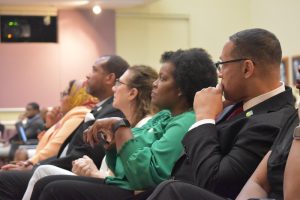During his State of the City speech Monday night, Durham Mayor Steve Schewel stressed the importance of addressing three major issues — public housing, climate change and gun violence — that disproportionately impact African Americans.
He vowed to take on “the devastating and lasting legacy of racism, our great, national sin.”
Schewel introduced public housing reform efforts by recognizing the pain caused by the crisis at public housing complex McDougald Terrace, where 270 families were evacuated in January due to carbon monoxide leaks.
“For 40 years, we have failed you,” Schewel said to the residents in the crowd, emphasizing his administration’s efforts to do “the work that the federal government should be doing” through Housing and Urban Development (HUD) funding.
Schewel outlined plans to allocate more than $15 million in tax funds for the Durham Housing Authority’s (DHA) renovations of hundreds of affordable housing units, and $1.4 million in upgrades for the electrical system at McDougald Terrace.
DHA will use $59 million of the $95 million affordable housing bond voters overwhelmingly approved in 2019 to redevelop properties into mixed income communities with no increase in rent, he said.

Former Durham city council member Jackie Wagstaff said she isn’t satisfied by the proposed housing initiatives because they aren’t affordable for people living in poverty.
“For some of us that live in this community, you didn’t speak our language,” she said to Schewel at the city council meeting after the address. “When you have no income, but you need somewhere to live, how do y’all address that?”
In the address, Schewel emphasized other justice issues in Durham as well. He announced a climate action plan to localize the efforts of the proposed Green New Deal — a vision he dubbed “Green New Durham.”
Some efforts include renegotiating an agreement with Duke Energy so Durham has more control over its use of solar power, requiring all city-funded construction to meet sustainable building standards and halving the waste sent to landfills by 2024.
He proposed making public transportation systems more efficient, with a focus on providing services to low-income residents.
The mayor also cited violence in the city as an urgent problem. Despite the decline in shooting victims in the last three years, he said 189 people were shot in the last year in Durham, and that he is determined to bring that number down.
Schewel expressed his support for a proposal to add six new officers to the police department’s gang unit — a measure unanimously passed by the city council Monday night.
The city will continue supporting racial equity training for officers, second-chance initiatives for people with criminal records and deferral of first-time offenders to Durham’s misdemeanor diversion court.
Schewel also announced plans to pressure Congress to create a comprehensive national reparation policy for racial injustice.
He invited mayors from neighboring cities and towns to join him, because he wants the work to start at home.
‘It’s been a tough year, but still, we rise,” Schewel said. “Let’s make this city we love a city for all.”




Comments are closed.